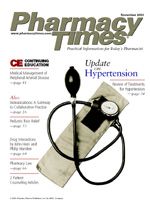Publication
Article
Pharmacy Times
Reyataz (Atazanavir sulfate, BMS-232632)
Background
The Centers for Disease Control and Prevention (CDC) estimates that approximately 42 million people currently live with HIV/AIDS. Of these, an estimated 38.2 million are adults and 3.2 million are children under the age of 15. In 2002, 5 million new cases of HIV infection and 3.2 million deaths due to AIDS were noted.1
The current mainstays of therapy include protease inhibitors, nucleoside reverse transcriptase inhibitors, and nonnucleoside reverse transcriptase inhibitors. By targeting replication enzymes, researchers have developed strict regimens for patients to follow. The increasing demands of multidose therapy have led to the development of once-daily highly active antiretroviral therapy medication. Reyataz, manufactured by Bristol-Myers Squibb, was recently approved by the FDA for the treatment of HIV-1 in combination with other antiretroviral agents.
Pharmacology/ Pharmacokinetics
Reyataz is an azapeptide HIV-1 protease inhibitor that selectively inhibits the viral processing of Gag and Gag-Pol within the HIV-1 infected cell. This inhibition prevents the formation of mature virions. Reyataz is rapidly absorbed (Tmax, 2.5 hours), with a steady state achieved between days 4 and 8. The mean elimination half-life is approximately 7 hours.2
Clinical Trials
Study AI424-034 was a randomized, double-blind, multicenter trial comparing Reyataz with efavirenz in patients who had not had prior antiretroviral therapy. In that study, 810 participants were randomized to receive Reyataz 400 mg once daily or efavirenz 600 mg once daily, along with a fixed-dose combination of lamivudine 150 mg and zidovudine 300 mg twice daily. Response was based on subjects achieving and maintaining confirmed HIV RNA <400 copies/mL through all 48 weeks. Results at 48 weeks yielded a comparable response in the Reyataz (67%) and the efavirenz (62%) treatment groups. Additionally, the mean CD4 cell count increase from baseline was 176 cells/mm3 in the Reyataz arm and 160 cells/mm3 in the efavirenz arm.3
Study AI424-043 is an ongoing randomized, open-label, multicenter trial comparing Reyataz with lopinavir/ritonavir in patients who did have prior antiretroviral therapy. Participants were randomized to receive Reyataz 400 mg once daily or lopinavir/ritonavir 400/ 100 mg twice daily, along with 2 nucleoside reverse transcriptase inhibitors. Preliminary results?presented at the 2nd International AIDS Society Conference in Paris in July 2003?from 229 patients at 24 weeks showed a higher percentage responding to the lopinavir/ ritonavir therapy. Mean changes in CD4 (cells/mm3) from baseline were 101 for the Reyataz group versus 121 for the lopinavir/ritonavir group. Additionally, data presented showed that 54% of participants in the Reyataz group responded to treatment (HIV RNA <400 copies/mL), compared with 75% of those in the lopinavir/ ritonavir group.4
Safety
The most frequent adverse events reported with Reyataz among patients in clinical trials were nausea, headache, rash, abdominal pain, vomiting, diarrhea, peripheral neuropathy, depression, drowsiness, insomnia, and fever. Increases in indirect bilirubin, prolonging of the PR interval, increases in lactic acid, and increases in blood sugar also have been reported with the use of Reyataz. Conditions and medications that exacerbate these conditions should be monitored with caution when administering Reyataz.2 Reyataz is contraindicated with drugs that are dependent on CYP3A for clearance. Caution should be used with coadministration of Reyataz and sildenafil due to the chance of increased sildenafil concentrations. Concomitant administration of Reyataz with lovastatin, simvastatin, and/or St. John?s wort is not recommended. Additionally, caution should be used when other HMG-CoA agents metabolized by CYP3A are used concomitantly with Reyataz.2
Outlook
The recommended dose of Reyataz is two 200-mg capsules once daily (400 mg/day) with food in combination with other antiretroviral medications. The drug is supplied as 100-, 150-, or 200-mg capsules. It should be stored at room temperature.
For a list of references, send a stamped, self-addressed envelope to: References Department, Attn. D. Ryan, Pharmacy Times, 241 Forsgate Drive, Jamesburg, NJ 08831; or send an e-mail request to: [email protected].

Newsletter
Stay informed on drug updates, treatment guidelines, and pharmacy practice trends—subscribe to Pharmacy Times for weekly clinical insights.






